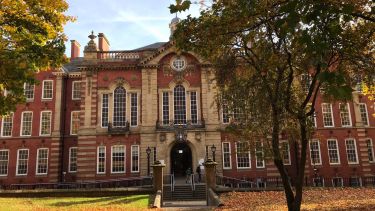º¬Ð߲ݴ«Ã½ the school
The school formed when the Departments of Automatic Control and Systems Engineering, and Electronic and Electrical Engineering were amalgamated. The new school also runs the General Engineering programme on behalf of all the contributing schools.

Research
Our teaching is informed by the research we do - and we do a lot!
Our academics have been awarded £50m of research grants in the last 5 years to provide solutions including to help achieve reliable renewable energy storage to supply the national grid, offshore wind energy production and 6G communications development. We also pride ourselves on having one of the largest engineering communities on control, automation and robotics in Europe.
The EPSRC (Engineering and Physical Science Research Council) is a government funded body and a major sponsor of university based research. They currently provide over £31m of sponsorship funding for our research activities and this makes us one of the best supported departments in the country. This level of support feeds directly into our teaching providing students with access to world-class facilities and exposure to the very latest developments in the field. EPSRC also provides an additional £500k as a Doctoral Training Award to provide scholarships for PhD students.
We are proud to host key research centres, including:
- The National Epitaxy Facility enables UK University research through provision of high quality Semiconductor Epitaxy.
- The Centre for Research into Electrical Energy Storage & Application (CREESA) is one of the UK’s leading research centres into energy storage.
- EPSRC Future Electrical Machines Manufacturing Hub which combines leading academic and industry experts to drive innovation in electrical machine manufacturing across a number of industries including Aerospace, Energy and High Value Automotive.
- EPSRC MM Wave Measurement Facility which uses state of the art equipment to measure and improve the effectiveness of antenna/transmitters that are wearable technology, data transfer and wireless communications depend on.
Teaching
We provide a range of undergraduate and postgraduate degree courses, and research degrees offering opportunities for postgraduate training. We pride ourselves on delivering a combination of theoretical and practical learning and in our Teaching Clean Room students create their own semiconductor structures replicating the chips used in modern technology eg mobile phones.
We have recently refurbished our Robotics and Automation lab, which is used by both our undergraduate and postgraduate students.
Experience a range of Engineering disciplines
We take an interdisciplinary approach to learning and teaching, so that our students work with a range of disciplines as they would in industry. These opportunities for collaboration extend across wide-ranging subjects within the School but also across the whole of Engineering and Computer Science:
- Our Science and Engineering Foundation Year (SEFY) provides a grounding for students who need an extra year of study to progress onto our degrees, including a choice of subjects from across the Faculty of Engineering and Faculty of Science
- Our General Engineering course is for students who want to study a wide range of engineering disciplines. You will be taught by experts from across all four of our schools in the Faculty of Engineering, giving you the skills and knowledge to shape your future career path
- The Diamond Building is the heart of our collaborative approach, providing teaching spaces and specialist laboratories for students from all our courses to work together on practical learning
